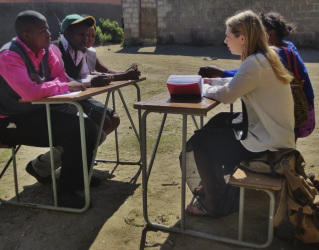
Their salaries are too low; their classrooms are overcrowded; and their own training is limited. Despite these obstacles the teachers of Luba Community School in Garden Compound, an informal settlement in Lusaka, try their best. Since Learning at Taonga Market, Zambia’s successful radio distance education program, ceased being aired by the national broadcaster, teacher training has suffered. Now, the most common qualification teachers can have is a Basic Learning Skills Program for Community School Teachers certificate administered by the Ministry of Education and USAID.
The 20-day one time training course, is not only time consuming but also expensive. Despite its cost, it’s still easier to obtain than a university teaching certificate. Universities are highly competitive, making it nearly impossible for community schoolteachers to progress formally.
Previously, teachers received certificates through training that accompanied Learning at Taonga Market. The head of Luba, Mr. Banda Lucas, emphasized how important Taonga was for the teachers. We discussed how the training told them exactly how to work the wind-up radio, teach the students and gave them confidence in the classroom. He explained that “it was easy for the teachers to make [their] lesson plans” when they had Taonga.
For community school teachers, their salaries come out of student school fees. At Luba the average is 20 kwacha a month, or about $4 per student. These fees must also fund the upkeep of the school.
Other schools I visited in the compounds reported having a difficult time keeping teachers. Frequently, teachers show up late or not at all and leave in search of better paying jobs. It is my understanding that government schools have this issue as well. It’s not uncommon for more than half the teachers on staff to report in sick on any given day or quit without giving notice. The commitment to the job is often low because the salary is not enough to sustain the teacher and their family. This obviously puts the learners in a precarious situation.
At Luba the teachers are making active strides to follow their education goals, while still fulfilling their role as a teacher. They want more education and formal training and often feel unprepared. To add further difficulty for the teachers, energy poverty affects them as much as the students. Because these teachers do not have electricity at home, they create their lesson plans at night with candles after teaching double sessions at school. The candle often burns out before they finish their lesson plans. Wilbroad Banda, a teacher at Luba, has lived in the compound all his life. He wants to further his education but says, “each night I try to also study history, but there is not enough of the candle to do both”.
With the limited resources they have, these teachers struggle to gain more skills and better their own educations. They know better than most just how important it is to all facets of life and are twice affected by a lack of reliable power.
The 20-day one time training course, is not only time consuming but also expensive. Despite its cost, it’s still easier to obtain than a university teaching certificate. Universities are highly competitive, making it nearly impossible for community schoolteachers to progress formally.
Previously, teachers received certificates through training that accompanied Learning at Taonga Market. The head of Luba, Mr. Banda Lucas, emphasized how important Taonga was for the teachers. We discussed how the training told them exactly how to work the wind-up radio, teach the students and gave them confidence in the classroom. He explained that “it was easy for the teachers to make [their] lesson plans” when they had Taonga.
For community school teachers, their salaries come out of student school fees. At Luba the average is 20 kwacha a month, or about $4 per student. These fees must also fund the upkeep of the school.
Other schools I visited in the compounds reported having a difficult time keeping teachers. Frequently, teachers show up late or not at all and leave in search of better paying jobs. It is my understanding that government schools have this issue as well. It’s not uncommon for more than half the teachers on staff to report in sick on any given day or quit without giving notice. The commitment to the job is often low because the salary is not enough to sustain the teacher and their family. This obviously puts the learners in a precarious situation.
At Luba the teachers are making active strides to follow their education goals, while still fulfilling their role as a teacher. They want more education and formal training and often feel unprepared. To add further difficulty for the teachers, energy poverty affects them as much as the students. Because these teachers do not have electricity at home, they create their lesson plans at night with candles after teaching double sessions at school. The candle often burns out before they finish their lesson plans. Wilbroad Banda, a teacher at Luba, has lived in the compound all his life. He wants to further his education but says, “each night I try to also study history, but there is not enough of the candle to do both”.
With the limited resources they have, these teachers struggle to gain more skills and better their own educations. They know better than most just how important it is to all facets of life and are twice affected by a lack of reliable power.
 RSS Feed
RSS Feed